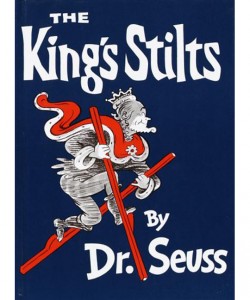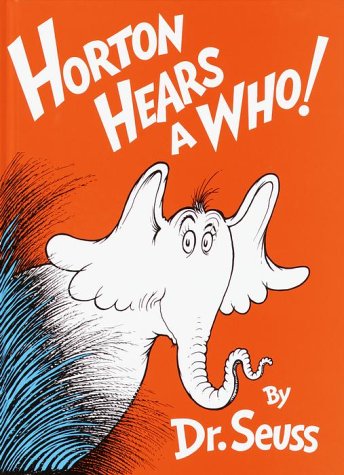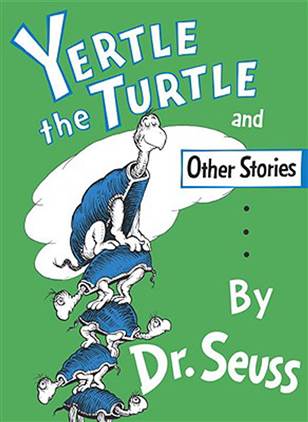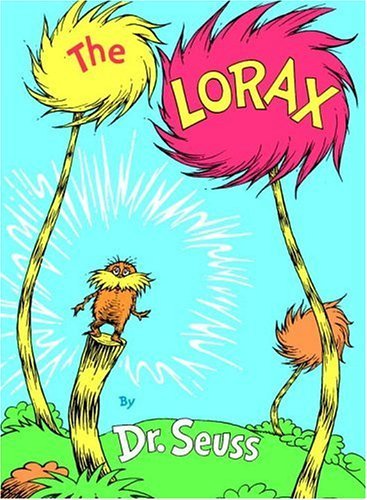Or maybe, rather, he studied and wrote about the same universal truths that Patanjali wrote about long ago in the Yoga Sutras.
Either way, here are four examples of Dr. Seuss classics colliding with ancient scripture:
1. The Lorax
The Once-ler, now old, sits tragically in a tall tower with years and years to think about his mistakes, with nothing to look at but a destroyed, empty landscape and the pile of rocks that say “unless.”
Ahimsa doesn’t only mean non-violence or non-killing; it means not bringing about pain-and that includes by intention, speech, and action. In The Lorax, the Once-ler is an ambitious entrepreneur who creates a bogus product (the Thneed, which everyone needs) and proceeds to destroy the environment to mass produce it and make big piles of money.
The Lorax, who speaks for the trees, is constantly trying to make him see the error of his ways-the cruelty and destruction—but the Once-ler can’t be bothered about the plight of the starving Brown Bar-ba-loots or the Swomee-Swans choking on the smog, he’s too wrapped up in the money.
Pramada is the Sanskrit word for the Once-ler, who will sacrifice anyone and anything for his selfish glory (this is a recurring characteristic of Dr. Seuss’s bad guys—you can see pramada in Yertle the Turtle as well). Once there’s nothing left for him to destroy, his factory is closed and he’s left with nothing.
The lesson is about karma: violent, cruel, and wasteful intentions and actions hurt you first. In the end he has nothing because he never built anything—he only took, until there was nothing left to take.
II.34: When negative thoughts or acts such as violence are caused to be done or even approved of, whether incited by greed, anger, or infatuation, whether indulged in with mild, medium, or extreme intensity, they are based on ignorance and bring certain pain.
“That was long, long ago. But each day since that day I’ve sat here and worried and worried away. Through the years, while my buildings have fallen apart, I’ve worried about it with all of my heart.” ~ The Lorax
Causing pain, even indirectly, and for whatever reason, will result in ignorance and misery. Greed causes some to steal and take, to pillage, for some kind of perceived gain (like monetary wealth), but stealing from nature you will never be wealthy.
“Unless someone like you cares a whole awful lot, nothing is going to get better. It’s not.” ~ The Lorax

2. The King’s Stilts
The King of Binn has to work long, hard hours protecting his thriving kingdom, and when he works he really works. At the end of a long day, he has a bit of fun putting on stilts and running about town. (I assume this is where the phrase “work hard, play hard” comes from.)
“But there was one man in Binn who didn’t like fun. He didn’t like games. He didn’t like laughing. This man was a scowler. This man was Lord Droon…Every afternoon when the Stilt Hour drew near, Lord Droon would slink away to his room in the northwest tower and sulk. ‘Such carryings on!’ he would mutter in disgust, as he spied on the King from his window. ‘Look at his crown! Bouncing up and down on the side of his head! Look at his beard! Flapping in the wind. Look at him laughing! Right out in broad daylight in front of the townsfolk! I must do something about this.’ And one day he did.” ~ The King’s Stilts
Lord Droon’s judgment of the King, and his disapproval of happiness and friendship, leads to the near destruction of the Kingdom of Binn.
We have to remember that jealousy, anger, hate, and judgment—which all grow from fear—hurt you first. Lord Droon is a terribly unhappy character, suffering to the point of taking it out on his friends and his whole kingdom. Sutra I.33 gives us an alternative:
By cultivating attitudes of friendliness toward the happy, compassion for the unhappy, delight in the virtuous, and disregard toward the wicked, the mind-stuff retains its undisturbed calmness.
Dr. Seuss paints a picture of the destruction and pain caused by jealousy and anger toward the happy, and this Sutra directs us on how to prevent it. Cultivating happiness for the happy isn’t always easy, especially when they have something you [think you] don’t, but it always pays off-for you and those around you. You are responsible for your own happiness and what you do with it.

3. Horton Hears a Who
Horton Hears a Who is one of the most famous texts by Dr. Seuss, and those that are familiar can hardly forget the darkness and disparity of ignorance, and the famous line:
“A person’s a person, no matter how small.” ~ Horton Hears a Who
Horton, a kind and faithful elephant, stumbles across a tiny world of teeny tiny people living upon a clover. Because of his excellent hearing, he’s able to communicate with them and promises to protect them. An uppity kangaroo, terrified of anything different that she doesn’t understand, campaigns to destroy this world by force. Horton is ultimately beaten and imprisoned for standing up for what he believes in-and trying to save the Whos.
Eventually, with the participation of every little tiny being, the tiny world makes enough sound that the kangaroo hears it and, thus proving their existence, she calls off the fight and promises to help Horton protect them. (Side note: the Whos have a wonderful sense of sangha, community, that you can see here as they all rise up together, and also in The Grinch who Stole Christmas when they still come together to celebrate despite hardships.)
This is not a new story; if we look at the history of humans it’s happened over and over again. Hatred is a strong motivation for destruction, and it comes straight from fear. Every emotion is rooted in fear or in love. When humans identify with their ego, they are afraid of what they don’t understand. Fear turns into hatred which turns into violence.
II.3: Ignorance, egoism, attachment, hatred, and clinging to bodily life are the five obstacles. [to growth and enlightenment]
“[Ahimsa] is more than a negative command not to kill, for it has a wider positive meaning, love…Violence arises out of fear, weakness, ignorance, or restlessness. To curb it what is most needed is freedom from fear. To gain this freedom, what is required is a change of outlook on life and reorientation of the mind. Violence is bound to decline when men learn to base their faith upon reality and investigation rather than upon ignorance and supposition.” ~ B.K.S. Iyengar (on II.35 from Light on Yoga)
Let’s talk about Horton. His faith, love, and devotion to the tiny world were so strong that he risked his life and well-being to protect them. Horton represents all the good qualities that the Sutras urge us to work for: amity, honesty, greedlessness, devotion, grace. He loves without expectation, he stands up to evil fearlessly, he disregards the wicked. Horton Hears a Who is a classic tale of good vs. evil—where the evil is ignorance and good is love. How do we fight and eradicate ignorance, violence, discrimination, and hate? With love.

4. Gertrude McFuzz
II.15: To one of discrimination, everything is painful indeed, due to its consequences: the anxiety and fear over losing what is gained; the resulting impressions left in the mind to create renewed cravings; and the constant conflict among the three gunas which control the mind.
Although there’s a lot going on in this Sutra, you’ll understand if you just think about whether anything from outside of you has ever made you truly, completely happy. More often than not it’s the opposite, but it seems as though we’re sometimes reaching for what we don’t have anyway.
“Do they really enjoy their money? No. They just want to posses it. All our so-called pleasures bring in the fear of losing them.” Swami Satchidananda (on II.15)
“There once was a girl-bird named Gertrude McFuzz, and she had the smallest plain tail ever was. One droopy-droop feather. That’s all she had. And, oh! That one feather made Gertrude so sad.” ~ Gertrude McFuzz from Yertle the Turtle and Other Stories
When I think about the Sanskrit word santosha, I think about Gertrude and how she just can’t be content with what she has. But of course, it’s not just that she’s not happy with her own looks, she’s also jealous Lolla-Lee-Lou (who instead of one feather behind, she had two!) and her jealousy makes her terribly angry.
Who can be happy when there’s a fancy bird flying around with more feathers than you? In her fury and desperation, she tantrums and begs until a doctor tells her about a pill that will grow her more feathers. The pill works, so she gorges herself upon them until she has 90 lbs of feathers,
“The next thing to do is to fly right straight home and show Lolla-Lee-Lou! And when Lolla sees these, why her face will get red and she’ll let out a scream and she’ll fall right down dead!” ~ Gertrude McFuzz
It turns out that Gertrude grew so many feathers that not only could she not fly, she also couldn’t even walk home. Ultimately all the feathers had to be plucked out.
It’s great to have a lot of feathers, like Lolla-Lee-Lou, just like it’s great to have a beautiful face or a lot of money, and just like it’s great to have one feather or not very much money; the important thing is not to let any of that bring fear and worry. Things from the outside will come and go, and you get choose whether they bring pleasure or pain.
“And, finally, when all of the pulling was done, Gertrude, behind her, again had just one…that one little feather she had as a starter. But now that’s enough, because now she is smarter.” ~ Gertrude McFuzz
References:
All Sutra translations are by Sri Swami Satchidananda in The Yoga Sutras of Patanjali
The Lorax by Dr. Seuss
The King’s Stilts by Dr. Seuss
Horton Hears a Who by Dr. Seuss
Gertrude McFuzz from Yertle the Turtle and Other Stories by Dr. Seuss
Light On Yoga by B.K.S. Iyengar
Relephant reads:
If Dr. Seuss had Been a Yogi.
What Our World might have Looked Like without Dr. Seuss.
Author: Sarah Haubert
Editor: Catherine Monkman
Photo: Wikimedia (Fair Use): 1, 2, 3, 4







Read 1 comment and reply